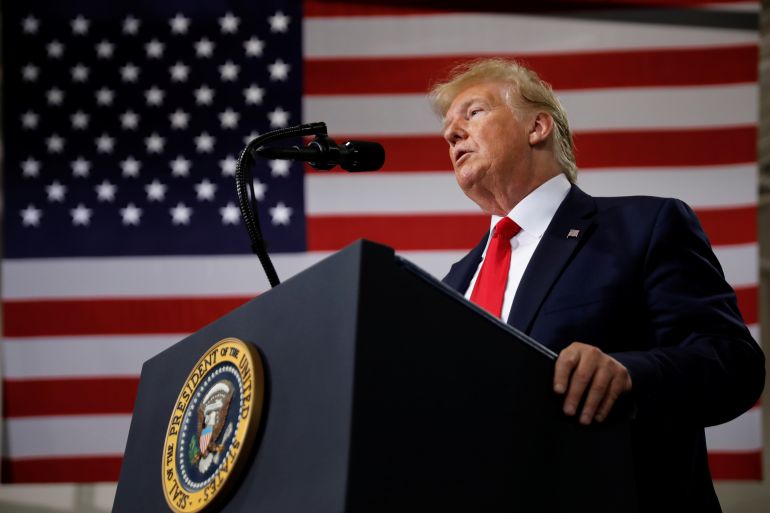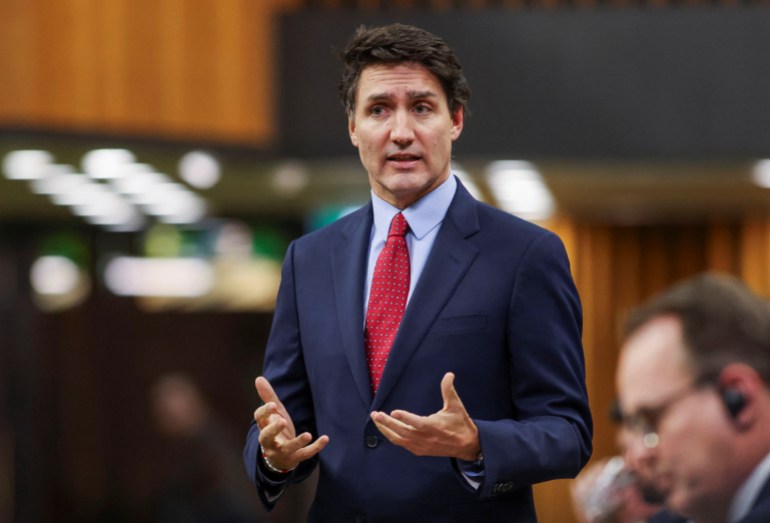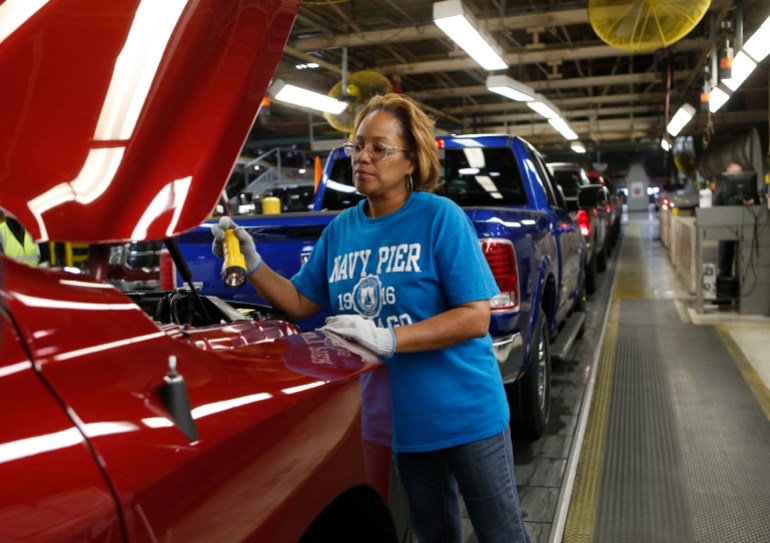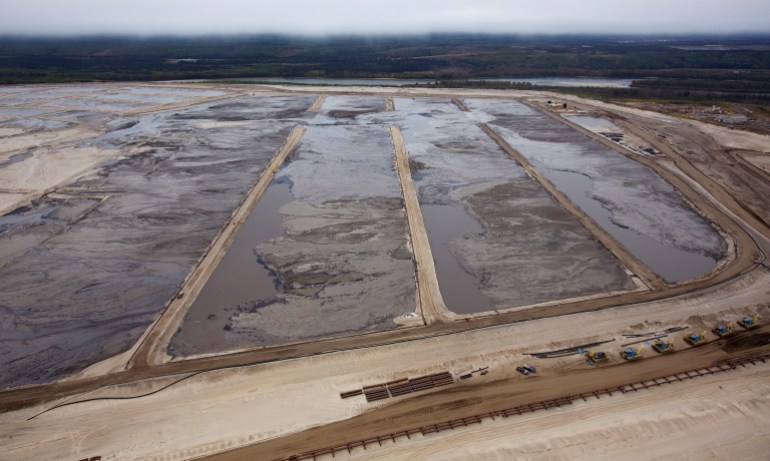As Trump’s tariff threat looms, what would a US-Canada ‘trade war’ mean?
- 国际
- 2024-12-27 05:32:06
- 19

Montreal, Canada – Donald Trump is less than a month away from being sworn in as the next president of the United States, and the Republican leader is set to usher in a number of serious domestic and foreign policy shifts.
In advance of Trump’s inauguration on January 20, countries around the world have been preparing for another "America First” administration that could drastically alter their relationships with Washington.
For Canada, a top US global ally, the countdown to Trump’s second term has also been a countdown to a looming threat that could upend the Canadian economy and years of strong trade ties between the neighbouring nations.
Late last month, Trump said he planned to impose 25-percent tariffs against Canada – as well as Mexico – if the country did not do more to stem irregular migration and the flow of illegal drugs over its border with the US.
The plan, which has drawn widespread concern from Canadian politicians, will come into effect "on January 20th, as one of my many first Executive Orders”, Trump said on his Truth Social website.
Advertisement
While Canadian Prime Minister Justin Trudeau has stressed the need for dialogue and cooperation, Trump’s warning has thrown Canadian politics into disarray.
Last week, Canadian Finance Minister and Deputy Prime Minister Chrystia Freeland resigned over a disagreement with Trudeau over how to handle Trump. She said Canada needed to take the threat of tariffs "extremely seriously” and warned of "a coming trade war” with the US.
But is a "trade war” actually looming? What would imposing 25-percent US tariffs on Canadian goods and services mean for both Canada and the United States? And will Trump really follow through on his threat?
Here’s what you need to know.
First off, what did Trump say exactly?
In a post on Truth Social on November 25, Trump said he planned to "charge Mexico and Canada a 25% Tariff on ALL products coming into the United States”.
"This Tariff will remain in effect until such time as Drugs, in particular Fentanyl, and all Illegal Aliens stop this Invasion of our Country!” the Republican president-elect wrote.
"Both Mexico and Canada have the absolute right and power to easily solve this long simmering problem. We hereby demand that they use this power, and until such time that they do, it is time for them to pay a very big price!”
How did Trudeau respond?
The Canadian prime minister spoke to Trump the same evening that he threatened the tariffs.
"We talked about some of the challenges that we can work on together. It was a good call,” Trudeau told reporters the next morning.
Advertisement
"This is a relationship that we know takes a certain amount of working on, and that’s what we’ll do,” he said, adding that he stressed to Trump the importance of maintaining strong ties between Canada and the US.
In late November, Trudeau made a surprise visit to Mar-a-Lago, Florida, for talks with the US president-elect about the way forward. The Canadian government also unveiled a series of measures last week that it said would bolster security at the US-Canada border.
But while the prime minister has urged Canadian opposition leaders and provincial premiers to join a united "Team Canada” approach to the incoming US administration, he remains under pressure to do whatever it takes to avoid the tariffs.

How important is the US-Canada trade relationship?
Last year, the US and Canada exchanged $2.7bn ($3.6bn Canadian) in goods and services daily across their shared border, according to Canadian government figures.
"Many of these goods involve co-investing and co-development making our networks highly integrated,” the government said.
According to US Census Bureau data for 2024, through October, the US exported more than $293bn worth of goods to Canada while imports from its neighbour totalled nearly $344bn.
That made Canada the US’s second-largest trading partner behind Mexico, accounting for 14.4 percent of total trade.
The two countries also are signatories to the US-Mexico-Canada trade agreement (USMCA), a trilateral deal completed during Trump’s first term in office that updated the longstanding North American Free Trade Agreement (NAFTA).
Advertisement
What goods are being traded?
Canada exports a range of products to the US, including most notably petroleum.
The country is the US’s largest foreign energy supplier: Sixty percent of American crude oil imports came from Canada in 2023, up from 33 percent a decade earlier, according to the US Energy Information Administration research group.
Canada sent about 97 percent of its crude oil exports south of the border last year. The vast majority of those supplies came from the oil-rich province of Alberta.
It also exports motor vehicles and parts; forestry products; chemicals and plastics, and minerals to the US, as well as supplies of electricity.
On the flip side, the goods that Canada imports from the US are similar to what it exports.
The country imports motor vehicles and parts, as well as energy products, from its southern neighbour. Canada also imports machinery; transportation equipment, and chemicals and plastics, among other things.
"Fully integrated US-Canada supply chains exist in dozens of sectors and hundreds of industries,” explains Roy Norton, a global fellow at the Wilson Center think tank in Washington, DC.
"Components made in one or the other country routinely comprise part of the final product coming off the assembly line in the other country. The effect of this integration has been to keep prices down in both countries, enhancing the global competitiveness of US and Canadian firms.”

All right, so what effects would a 25-percent US tariff have on Canada?
Economists and other experts have been clear that 25-percent tariffs would hit Canada hard.
Advertisement
"Let’s not kid ourselves,” Trudeau said earlier this month. "Twenty-five-percent tariffs on everything going to the United States would be devastating to the Canadian economy.”
Michael Davenport, an economist at Oxford Economics, said (PDF) in a late November report that blanket 25-percent US tariffs, combined with proportional retaliatory measures by the Canadian government, would push Canada into a recession in 2025.
Canadian exports would drop and the country’s gross domestic product would fall 2.5 percent by early 2026, Davenport said. Inflation would reach 7.2 percent by the middle of next year and 150,000 layoffs would push the unemployment rate to 7.9 percent by the end of 2025.
"Canada’s energy, auto, and other heavy manufacturing sectors would be hardest hit by the blanket US tariffs because of the high degree of cross-border trade in these industries,” the report said.
"These sectors rely heavily on exports to the US, but also source a sizeable share of their inputs from the US, making them highly exposed to tariffs.”
What about the impact on the US?
Given how integrated the US and Canadian economies are, the United States would be hurt by blanket tariffs, as well.
The Oxford Economics report said the 25-percent US tariffs and similar retaliation from Canada would push the US into what’s known as a "shallow recession”, or when some parts of the economy are doing well while others are struggling.
Disruptions to the North American supply chain would hurt American manufacturers and local economies.
Advertisement
An October report for the Canadian Chamber of Commerce’s Business Data Lab noted that Canada is the primary export market for 34 US states — making them "surprisingly dependent on Canadian trade”.
Trevor Tombe, an economics professor at the University of Calgary and the report’s author, noted for example that Montana’s trade with Canada accounts for 16 percent of the state’s economy while Michigan’s is 14 percent. "Even as far away as Texas, trade with Canada still accounts for 4 percent of the state economy,” Tombe said (PDF).
Karl Schamotta, chief market strategist at Corpay, a US-based business payments and management company, said in a market brief from late November that, given what is traded between the US and Canada, Trump’s plan "looks like an own goal”.
"US imports from Canada are heavily concentrated in products that make up a big share of middle-class consumption baskets – oil, natural gas, motor vehicles, food, and building supplies – meaning that tax increases will be highly visible,” Schamotta wrote.
"On the flip side, exports to Canada are often of the higher value-added kind … – suggesting that a vast range of businesses in battleground states could be negatively impacted. If the US raises tariffs by the amount threatened – and if Canada responds in kind – the domestic political blowback could derail a range of important policy projects.”

Will Trump follow through on his threat?
That remains to be seen, but many experts have said they believe Trump is posturing and does not intend to impose blanket 25-percent tariffs on Canada.
Advertisement
Instead, some say the US president-elect is hoping to extract concessions from his country’s northern neighbour, particularly on longstanding trade and immigration issues.
"Notably, the overwhelming consensus among economists is steep tariffs, especially on Canada and Mexico, would lead to adverse near-term supply chain disruptions and inflict pain on US businesses and households,” Marc Ercolao, an economist at TD Economics, said in a report in late October, just before the US election.
"We suspect that the former President wouldn’t tolerate a recession or major market shock on his watch, but the net effect of his policies could lead to just that.”
Ercolao added that the "most likely scenario” under a second Trump administration would be for Washington to seek concessions under the pending review of the USMCA free-trade agreement, set for 2026.
Davenport, the Oxford Economics economist, echoed that in his report, saying that blanket tariffs would harm the US economy and the US-Canada trade relationship, and "directly fly in the face of the USCMA”.
Instead, he said that "it’s more likely that Trump will impose targeted tariffs on specific areas that have been central points of contention in Canada-US trade relations in the past”.
"These include steel, aluminium, other base metals, lumber, and agricultural products like dairy.”
If the US tariffs are imposed, will Canada enact retaliatory measures?
That remains unclear.
So far, Trudeau has not announced any concrete plans to impose any retaliatory tariffs or other measures on the US. But the Canadian prime minister has said his government will "respond to unfair tariffs in a number of ways”.
Advertisement
"We’re still looking at the right ways to respond,” he said on December 9.
Citing unnamed officials familiar with the discussions, Bloomberg reported earlier this month that Trudeau’s government is examining the possibility of levying export taxes on major Canadian exports to the US.
The officials said export levies would be a "last resort”, according to the report, while "retaliatory tariffs against US-made goods, and export controls on certain Canadian products, would be more likely to come first”.
For his part, Conservative opposition leader Pierre Poilievre, whose party is widely expected to win federal elections slated for next year in Canada, has used Trump’s tariffs threat to attack Trudeau and demand his resignation.
But Poilievre has offered few details of how he would respond to the US tariffs if he were prime minister. "President Trump is a dealmaker,” he told CTV News on Friday. "He wants America to win, there’s no question. But I want to show him that Canada can win at the same time. He will put America first; I will put Canada first.”
Pressed on what that means in terms of policy, Poilievre added, "What are the negotiating tools I have? I can say, ‘Look, Mr President, if you try to cripple our economy, obviously, we would have to respond with counter-tariffs that would hurt on the American side.'”














有话要说...